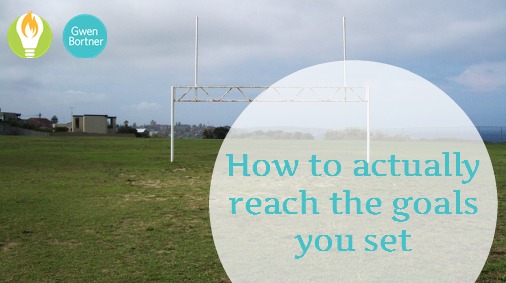
by Gwen Bortner | Leadership, Tasks & Goals
Are you spending all your time in the day-to-day tasks of running your business, or do you regularly take time to think about what truly matters to you and plan out your overall mission and vision? If you don’t know where you’re going, or have a plan for how to get there, how do you ever expect to grow?
Do you (and everyone who works with you) know what you’re actually trying to accomplish? Have you ever outlined a “mission and vision” statement for your company?
Get Clear on Your Mission
Mission and vision statements aren’t any good if they’re super vague – there needs to be a clear objective. When you write yours, instead of saying things like “strive to provide excellent customer service,” write out your objectives using specific parameters and terms. Think of this as the way you want to do business, the type of company you want to run, and the type of CEO/owner/leader you want to be. Get very specific, and keep it simple. Otherwise, how will you know when you’ve succeeded?
Plan Your Goals
Once you have identified your bigger mission, it’s time to set goals that will help you achieve it. Something I have kept with me from my adventures in the knitting industry was this nugget of wisdom by Cath Kidson:
Stay true to your idea
Learn to say no,
Don’t confuse a distraction for an opportunity,
Trust your gut,
Don’t be afraid to ask for help,
Stay focused (See reference here.)
Remember as you’re setting your goals to always keep your mission statement in mind. For every opportunity that comes your way, hold it up in the light of your mission statement and make sure it’s a good fit before you go running down that path. Stay on top of your current goal, and focus on one thing at a time, to see real progress.
Test the Theory
It’s time to put your mission statement to the test:
- Could it be anybody’s, or is it distinctly yours?
- Ask your employees (if you have them – or consultant/contractors): what is their ultimate goal for your business? How similar are their answers and how close are they to YOUR answer?
- What would your customers say? If you asked them what your goal is, would they even be able to come close?
Once you have provided honest answers to these questions, you may realize that you need to tweak your mission statement to improve it. The process should constantly evolve as you do and as your business grows, so make a point to revisit it once a year and see if any changes need to be made.
By focusing on what’s most important and regularly reminding yourself of your larger goals, you’ll find you actually get where you wanted to go.

by Gwen Bortner | Tasks & Goals
Setting goals is great – it feels so good to think about the future and make plans for the greatness you will achieve in the coming year. The hard part comes when you start looking back at the goals you set, and you realize you haven’t met any of them. Stop letting yourself down – learn how to actually MEET the goals you set so that you don’t have to feel like a failure any more!
Here are my best tips for achieving the goals you set for yourself, whether they’re for life or business or both!
Tip #1: Understand whether or not this goal REALLY matters to you.
Often when we fail to reach a goal, it’s because we gave them lip service but weren’t truly inspired to reach them. We thought we should set the goal but as it turns out, we don’t want to actually work with it. So the first step is to eliminate all the goals that don’t actually matter. Though this may *feel* a bit like failing at those goals, in reality it’s more like de-cluttering your goal list so you can focus on working towards the things that matter most.
Tip #2: Keep your goal count low.
When you set too many goals at once, you’re focusing on too many things and you don’t get any progress made. Even if you have several goals in mind, choose just a few to focus on at any one time so that you can make real progress. It’s better to check off your goals one at a time because you can use that progress to motivate you to work toward the next goal, rather than pushing yourself to work on too many projects at once and feeling like you’re never going to finish anything.
Tip #3: Partner with someone who has similar goals.
This type of relationship is called an accountability partner, and it can be really helpful to work together with someone who has similar goals to your own. The concept is most familiar in the form of a workout buddy but it can be applied to any goal. The key is to work toward supporting one another and not turn it into a competition.
Tip #4: Work with someone who can help to push you toward reaching your goal.
Instead of an accountability partner (someone who has a similar goal), this tip is more about finding an outside person to motivate you to work on your goal. It might be a partner or friend or it could be someone like a business consultant or coach.
Tip #5: Set 3-Level Goals.
Todd Herman suggests you should give yourself goals at 3 levels: good, better, best. For instance: the best-case scenario is that you want to lose 50 pounds, but good would be 10 and better is 25. If you ONLY set the highest-level goal then it often takes too long to reach it and it’s easy to get discouraged. But when you reach the good or better goal then that can even be what motivates you to push to the next level.
Tip #6: Look for the WOW Mindset.
Instead of looking at how far you have to go, you look at how far you have already come. Instead of, “I’ve still got 9lbs to lose,” think of it like, “WOW, I lost a pound already!” Looking at your goals from the mindset of the progress you’ve made rather than what’s left to do is a way to encourage yourself to keep making that progress. (This is another of Todd Herman’s great ideas!)
Tip #7: Avoid the OW Mindset.
Herman’s final contribution to this post is the “OW Mindset,” or the idea that all too often we focus on what’s left to come instead of on how far we have already climbed. This tip is the companion to the last one; avoid thinking of the “pain” of what’s to come and instead focus on the success of what you’ve already achieved.
Tip #8: Recommit to your goals on a regular basis.
Review your progress, make adjustments as needed, and keep moving forward. This is the foundation of making actual progress – the process of checking up on the progress you’ve made and reminding yourself why you wanted to achieve that goal in the first place.
Every quarter I host a group session to help you to do these things – review and plan. Read more about the Quarterly Tune-Up here. Click the Register Now link if you are interested.

by Gwen Bortner | Tasks & Goals, Tips & Tricks
When you were a kid, there were probably several people in your life who encouraged you to read more: parents, teachers, librarians, etc. Now that you’re an adult, you have to make your own choices about how to spend your time (both leisure and working time), and you may find that you’re not making as much time for books as you once did. Today I hope to encourage you to reconsider.
Books are amazing little packages, full of information, entertainment, and sometimes even life-changing insights. Here are just 5 of the many reasons books are so incredible:
Reason #1: Books are Portable
You can take a book with you almost anywhere, which makes it easy to “sneak in” some reading time in your everyday life. If you always have a book handy, I think you’ll be surprised how much reading you can do in the time that might otherwise have been wasted. Here are just a few ideas: the waiting room at a doctor’s office, in line at the DMV, waiting for your kids to be finished with soccer practice (or insert some other activity of your choice), while the pot boils on the stove for dinner.
Action step: Put a book in your purse or car and see how much “sneaky reading” time you can accumulate this week!
Reason #2: Books are Inexpensive
You can find inexpensive books almost anywhere – local thrift stores, used book stores, and online sales sites. Of course, you can also find them for free at your local library or a little free library. For very little money you can gain hours of entertainment, insights for your business, and learn pretty much anything you’d ever want to know!
Action step: Go to your local library or a used book store and pick out a few titles that interest you!
Reason #3: Books Transcend Time and Space
Books are timeless – you can get as much out of a book that was written 100 years ago as you can from a book that was written this month. Though at times the information included in non-fiction books is outdated, they often have nuggets of wisdom that withstands the test of time. Books are a way to connect with our history and to carry on the stories of the past.
Action step: Add one book to your TBR pile that was written at least 50 years ago.
Reason #4: Books Have Multiple Uses
Want to learn to bake a cake? Change a tire? Build a website? Speak a foreign language? Would you like to experience the sensation of riding a dragon, slaying a wild beast, or getting your letter to Hogwarts? Books can do all this, and so much more! There are so many different types of books out there that you can have almost every possible experience within the pages of a book.
Action step: Add a book to your TBR pile that is a different genre than what you normally choose.
Reason #5: Books are Available in Multiple Formats
You no longer have to consider yourself “a reader” in order to enjoy books. Load your iPod up with audio books and enjoy them in the car on your commute, or pop in some ear buds and listen as you complete your weekly chores. Depending on the nature of your job, you might even be able to listen at work! Thanks to the magic of e-books, you no longer even have to leave your house in order to find a good book. You can download one instantly to your tablet or phone using your library’s website or a book selling site like Amazon. Books are literally now available at any time in almost any format – so what’s YOUR excuse for not reading more?
Action step: Try an audio book or e-book this week!
Would you like to not only read more books, but actually DO something with the knowledge you gain from them? Join us for the Small Biz Book Club, where every month I will translate the “big ideas” in popular business books into language that applies to you and your business, no matter the size. Enter your e-mail into the box to sign up.

by Gwen Bortner | Tasks & Goals
As I began 2017 I reconsidered all of my “start of the new year behaviors” and decided that “simpler is betterer.” (I know it isn’t a word, but it catches your attention)!
Resolutions are OUT, Goals too COMPLICATED
New Year’s resolutions have become passe. Most resolutions are “broken” by mid-month anyway, so why even pretend you are going to set one?
Although I am still a fan of goals, they are not actually simple. As something to give us longer-term, specific or big results, goals are awesome. But to help us make the consistent, sometimes small steps forward, they just are not as useful.
So the question I asked myself this year was: In addition to setting goals, what can I do that will help me stay focused on moving forward, but be so simple I won’t have to struggle with integrating it into my daily life and routine?
One Word
Several years ago my friend and former business partner Kellie shared with me that she picks a word for the year as her focus. She then adds a custom charm (pendant) to her always worn necklace (you can get some ideas here). I liked the concept but didn’t act on it then.
Fast forward to just a few weeks ago and I was introduced to One Word That Will Change Your Life by Jon Gordon, Jimmy Page, and Dan Britton. It is a quick read (or listen) and can help you discover a single word focus for the upcoming year. So I engaged in the process.
Three Words
At around the same time, Chris Brogan wrote about his process of identifying three words for the year. He finds that three words provides a bit more robust focus without over complicating the process. He is adamant that they just be three individual words, not a phrase.
Chris’s process is somewhat different than the One Word process outlined in the book, but I definitely see how it would provide insight and value. Particularly depending upon how your own mental, emotional, and spiritual processes work. Three has always been a favorite number of mine (possibly because I was born on the third).
Four Words
Chris says four words didn’t work for him, but I loved the Four-Word Poem concept I learned last spring from Marlon Hall. It really is more like a mantra, a catch-phrase, or possibly a purpose, but ultimately has some of the same objectives of simplifying focus to ensure forward direction.
As a “logic” person, I like structure, so the simple structure appeals to me. However, it does feel different than either of the two approaches above.
My Answer for Me
I have decided to try all three options out to see what makes the most impact and which, if any, seems to “stick.”
- One Word: Results – I am often busy, but busy isn’t the same as effective and there are many areas in my life that could use some tangible results.
- Three Words: Results, Simplify, Relax – To get results I am going to need to simplify in lots of areas (I have too much going on in too many different facets of my life). But I also need to remember and re-focus on relaxing. Not just “not working” but truly engaging in activities specifically for relaxation.
- Four Words: Inspiring Ideas for Success – This applies not only to myself but also how I interact with others in all the many areas in which I am currently engaged.
Which option appeals to you? One, three, or four words? Or do you have a different option? Share your thoughts in the comments below.
by Site Admin | Tasks & Goals, Tweet Image
Your business strategy might be similar to mine, or completely different. What it comes down to is, how do you spend the time that you have to work on your business? Where is your focus? Your strategy should be to focus on your highest goals, and put all your effort into working toward those goals.
How are you spending YOUR time?

by Gwen Bortner | Show Your Work, Tasks & Goals
In the past few weeks, there have been many changes at GwenBortner.com — none of which are visible in any tangible way. This is because all of the changes have occurred in my mind.
This is the trick of any change. The initial change is small, possibly minute, often so subtle that nobody actually notices. But tiny difference continues to grow, expand and eventually become obvious. That is what has been happening with me: tiny changes have been occurring over the past days, weeks and months. I now feel them starting to grow. Hopefully soon you will notice the difference too.
(more…)








